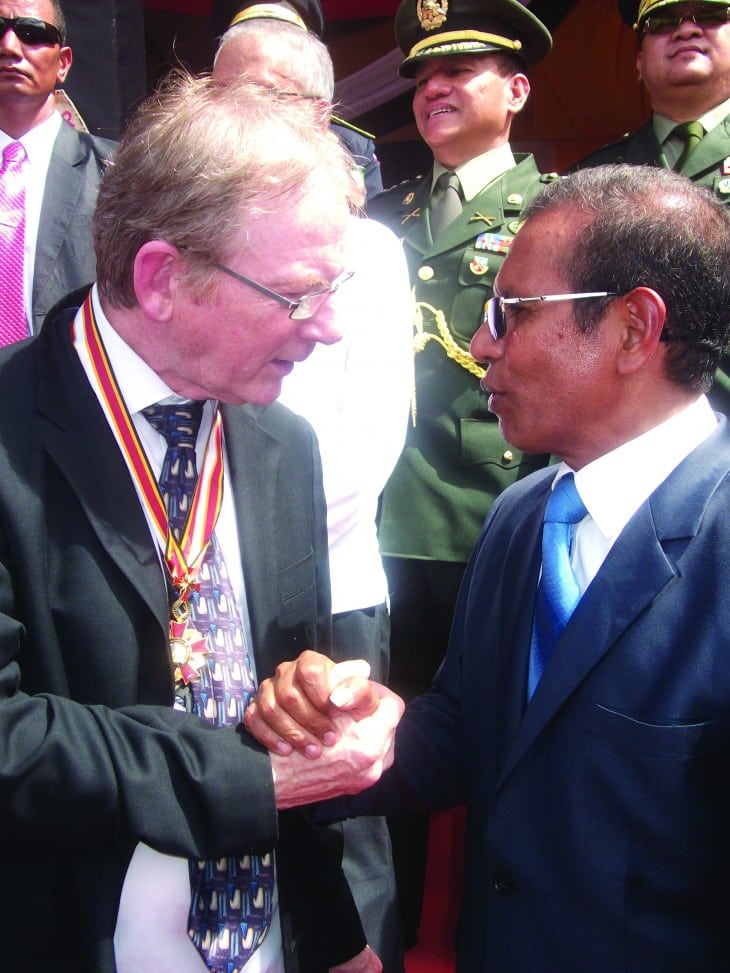The small tropical island of Timor Leste (East Timor) grows coffee like you’ve never tasted before! Cultivated under the shade of massive rainforest trees, free from pesticides and chemical fertilisers, its taste is rare and creamy. It is one of Timor’s main exports, bringing critical revenue into the first independent nation of the 21st century.
It was not coffee, however, but rather the courageous resistance of the people of this tiny country to colonialism and occupation that attracted recent interest in Timor, though it was its abundance of sandalwood that first drew European traders and colonialists to the island in the 16th century.
East Timor was brought to the attention of many Irish people in the 1990s by the inspirational work of former bus-driver Tom Hyland from Ballyfermot who saw a TV programme showing the brutal murder of 270 unarmed citizens by occupying Indonesian forces in the Santa Cruz massacre in the capital Dili, but had the unusual fibre to respond by forming the East Timor Ireland Solidarity Campaign (ETISC).
I was privileged to go to Timor last month to accept a Presidential medal, the highest honour that can be bestowed by the State, on behalf of ETISC. Oran Doyle accepted a similar medal on behalf of Sean Steele, a long time campaigner who unfortunately was unable to travel for health reasons.
When talking to the people of Timor, one is constantly reminded of the territory’s turbulent history; colonised by Portugal; losing around sixty thousand of its citizens when occupied by Japan during the Second World War; re-colonised by Portugal following the end of World War 2. Civil War followed Portuguese withdrawal in 1974 and a unilateral declaration of independence was made in November 1975. But Timor’s darkest period came later when, with the support of the US, Indonesia invaded Timor in December 1975 and an estimated 190,000 people (one quarter of the population) were eventually killed.
Determined resistance by the people of Timor, together with international solidarity, forced the Indonesians to accede to a referendum in 1999 in which the people voted overwhelmingly for independence. I visited it as part of an international human rights delegation in 1999 and found a population scarred by violence and repression but purposeful in preparation for a new era free from occupation and terror.
There have been bumps along the road of independence with occasional unrest and serious violence in 2006; and problems remain, including high unemployment and a failure to spread the benefits of oil revenue outside the capital Dili. But today the country effectively has a government of national unity which is trying to tackle some of the most urgent problems facing this fledgling democracy.
On a previous visit in 1999, I also visited the man who was seen as the leader of the resistance – the Nelson Mandela of Timor – Xanana Gusmaó in prison in Jakarta. Soon after that he was released and went on to become the first President of independent Timor Leste. During this visit I met Gusmaó, now an elder statesman, still hugely influential but handing over power to a younger generation of Timorese.
The current dominant issue in Timor Leste is the island’s relationships with its large and powerful neighbours, Australia and Indonesia. Timor’s decision not to pursue Indonesia for the crimes it committed during the occupation, while it may be ‘pragmatic’, is understandably unpopular, especially among some human rights groups.
Australia, on the other hand, is being challenged by the Timorese Government about the ‘dirty deal’ which was agreed by Indonesia and Australia in 1989, giving the vast oil resources in the Timor gap to Australia. Having stood by Australia during World War 2 and paid a high price, the Timorese now want Australia to respect their sovereignty and agree to a maritime boundary determination; as well as to cede a greater return on the lucrative Greater Sunrise oil and gas fields.
This is perhaps an incongruent focus in the context of climate change but, when I raised this issue in a meeting with the Prime Minister and his officials, I was informed that this is as much about sovereignty over land, air and sea as it is about fossil fuels. I was assured that the government is well aware of the need to develop strong policies on renewable energy and is already engaged in doing so.
Timor Leste faces many challenges. Issues of inequality need to be tackled, development is too centralised in Dili, the military and police take a too aggressive approach to citizens – in fact, Timor has recently been reprimanded by Amnesty International for “excessive use of force by security forces”. But it is important to keep in mind the strides it has made after only thirteen years of independence and to recall the difficulties involved in building a nation. •
Joe Murray is the Coordinator of Afri – Action From Ireland. @AfriPeace; www.afri.ie.
